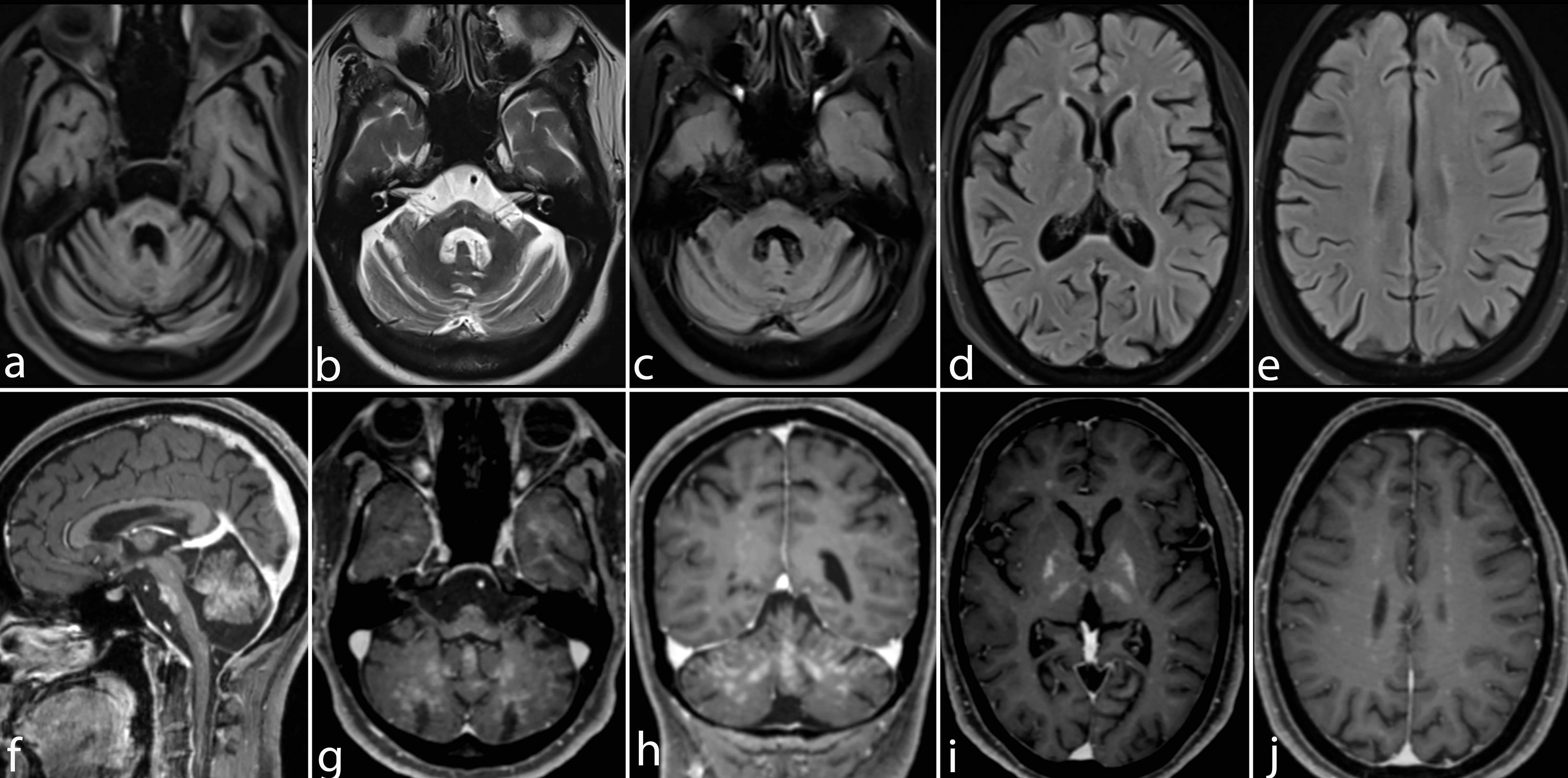Category: Ataxia
Objective: Anti-ZIC4 antibodies have recently been associated with paraneoplastic cerebellar degeneration (PCD) and are usually associated with small cell carcinoma lung. However, most of the diagnosed cases had the presence of other paraneoplastic antibodies, obscuring the significance of anti-ZIC4 antibodies. Some report that isolated ZIC4 positivity may be benign. We present a case of isolated anti-ZIC4 associated PCD with novel neuroimaging findings and good response to immunomodulatory treatment.
Background: PCD is characterised by a subacute onset, symmetrical ataxia, nystagmus and dysarthria. The most commonly associated malignancies and their antibodies are small cell carcinoma lung, ovarian malignancy and Hodgkin’s lymphoma and anti-Hu, anti-Yo and anti-Tr/DNER antibodies respectively. ZIC4 associated PCD is rare, and isolated ZIC4 PCD even rarer (less than 20 cases reported worldwide). Zinc-finger protein of the cerebellum (ZIC) comprises 5 transcription factors involved in the development and maturation of the cerebellum.
Method: A 53-year-old lady presented with insidious onset, gradually progressive ataxia with recurrent falls, dysarthria, upper limb tremors and occasional palpitations (without chest pain) for the past 1 year. She had pancerebellar signs, bradykinesia and appendicular rigidity on examination. MRI brain revealed brainstem and cerebellar atrophy with T2/FLAIR hyperintensities. Contrast imaging revealed punctate and linear enhancement in these regions and lower cranial nerves, along with intense enhancement in bilateral globus pallidi and thalami. CSF examination was acellular with slightly increased proteins. Autoimmune, ENA and SCA profile was negative and paraneoplastic panel showed positivity for anti-ZIC4 antibodies. Whole body PET and tumour markers were negative. Plasma exchange and intravenous pulse methylprednisolone pulse (1 gram daily for 5 days) led to good recovery. This was followed by weight based oral steroids and azathioprine, with persistent benefit.
Results: ZIC4 association seems to portend a benign association and better outcome.
Conclusion: We have presented an extremely rare case of ZIC4 associated PCD with novel neuroimaging findings, highlighting the need for a comprehensive evaluation of onconeural antibodies in patients presenting with subacute ataxia above the age of 50. Early diagnosis and management leads to better clinical outcomes and quality of life.
References: 1. Dalmau J, Rosenfeld MR. Paraneoplastic syndromes of the CNS. The Lancet Neurology. 2008;7(4):327–40.
2. Peterson K, Rosenblum MK, Kotanides H, Posner JB. Paraneoplastic cerebellar degeneration. I. A clinical analysis of 55 anti-Yo antibody-positive patients. Neurology. 1992;42(10):1931–7.
3. Graus F, Keime-Guibert F, Rene R, Benyahia B, Ribalta T, Ascaso C, Escaramis G, Delattre JY. Anti-Hu-associated paraneoplastic encephalomyelitis: analysis of 200 patients. Brain : a journal of neurology. 2001;124(Pt 6):1138–48.
4. Hoftberger R, Rosenfeld MR, Dalmau J. Update on neurological paraneoplastic syndromes. Curr Opin Oncol. 2015;27(6):489–95.
5. Loehrer PA, Timmermann L, Pehl A, Bien CI, Pfestroff A, Pedrosa DJ. Rhombencephalitis associated with isolated Zic4-antibodies in Paraneoplastic cerebellar degeneration: a case report. BMC Neurology (2020) 20:208
6. Grinberg I, Millen KJ. The ZIC gene family in development and disease. Clin Genet. 2005;67(4):290–6.
To cite this abstract in AMA style:
A. Agarwal, A. Garg, A. Srivastava. Isolated ZIC4 antibody associated paraneoplastic cerebellar degeneration [abstract]. Mov Disord. 2022; 37 (suppl 2). https://www.mdsabstracts.org/abstract/isolated-zic4-antibody-associated-paraneoplastic-cerebellar-degeneration/. Accessed April 19, 2025.« Back to 2022 International Congress
MDS Abstracts - https://www.mdsabstracts.org/abstract/isolated-zic4-antibody-associated-paraneoplastic-cerebellar-degeneration/

